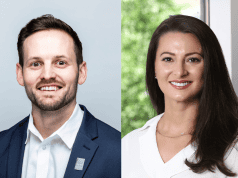It wasn’t so very long ago that a physician’s job was clear cut—practice medicine as they were taught in medical school and heal the patient. However, as healthcare systems expand, the medical profession itself has become more complicated.
Healthcare is a business like many other industries, but instead of just making money, healthcare workers must also save lives. Navigating patient care and profitability is a unique challenge that neither business professionals nor doctors are able to address alone. Goizueta helps bridge that gap, teaching clinicians the fundamentals of business and teaching business professionals how to apply their knowledge specifically within the healthcare field.
First and foremost, the chief medical officer must be a good physician, according to Gregory Esper MD 09EMBA, associate chief medical officer of Emory University Healthcare System.
There are no successful CMOs that are not first thought of as excellent clinicians. No physician body is going to follow a chief medical officer who they do not first trust clinically.
Gregory Esper MD 09EMBA, associate chief medical officer of Emory University Healthcare System
“You also have to have transparency and integrity―your ‘yes’ is yes and your ‘no’ is no―and that you are not rash in the decisions that you’re making. It’s important to weigh the gravity of situations and decisions that you need to make with great care,” Esper says.
Preparing Healthcare Leaders to Succeed in Business

It’s not often that medical schools teach budgeting, leadership, operations, and human resources. That’s why Emory University’s Goizueta Business School offers healthcare concentrations in its Full-time MBA, Evening MBA, and Executive MBA programs. Goizueta also offers its Chief Medical Officer Program within its Emory Executive Education department.
Nicola Barrett is Goizueta’s chief corporate learning officer and oversees Emory Executive Education. She says, “Healthcare leaders are facing so many new challenges. There’s the introduction of new technologies, changes in societal expectations, research that’s uncovering patient and population equity disparities, and burnout of clinical staff. And that’s just a few. Understanding these dynamics and leading others in a way that helps them feel valued and willing to embrace change is important.”
We’re helping to equip senior medical officers and healthcare leaders with the skills and knowledge to make good decisions for their patients, their people, and their organizations. We’re teaching them to be aware of the implications and opportunities afforded by the changing healthcare landscape, and to effectively contribute to the strategic direction and success of their enterprise.
Nicola Barrett, Goizueta’s chief corporate learning officer
Healthcare executives and doctors have been through many years of education as well as many years of experience in their field. They might wonder how an MBA or CMO certificate can help further an already established career.
Sarah Kier 20EMBA is vice president of enterprise access at Emory Healthcare. She says that learning with her cohort gave her a broader perspective on concepts that she already understood, but only from the perspective of her niche.
“When you’ve been in your industry for that long, you have a deep but fairly narrow understanding of the business world,” she says. “Gaining that kind of expansion, learning from people across industries, you start seeing things from a different chair or a perspective.”
Adapting to and Adopting New Technology

Goizueta alumni are leading the way in adopting developing technology, like artificial intelligence (AI), to create the healthcare systems of the future. They’re learning those skills at Goizueta.
There are many ways to integrate AI into the medical field. Some are already in use on a regular basis, including patient data analysis, maintaining records, and insurance and billing management. But the prospect of using AI as a diagnostic tool, and not just as an administrator, is expanding. The ability of AI to provide accurate diagnoses and assist in personalizing treatment means it is a viable tool to add to a patient’s treatment team. However, experts say it will never replace trained physicians.
“I like the approach of saying that today’s trainee is going to operate in 2050. What is their world going to be like then?” says Benn Konsynski, George S. Craft Professor of Information Systems & Operations Management.
The world they are entering now is going to be transformed radically, and they can be a part of that. They’re coming in with values that are different than their counterpart 20 years ago, and I think they will have more opportunities to shape that future than their predecessors.
Benn Konsynski, George S. Craft Professor of Information Systems & Operations Management
Embracing AI in Healthcare
Esper has already worked with AI tools like ChatGPT to make his job more efficient, using it recently with a colleague to help write a new policy. This task would have taken his team days, but with ChatGPT’s assistance it took mere minutes.
“AI will create efficiencies in the analysis of data, the ability to have predictive analytics, that are going to be considerable. Even pathologists and radiologists are now using AI to identify areas of abnormality on scans and pathology. At this point, it doesn’t substitute for human interpretation, but at some point, it may,” Esper says. AI is helpful but not quite perfect and may never be, which is where the element of human interaction is crucial.
“You have to be careful. You have to say, is this right? What could be wrong? How can I use this more effectively? What’s the appropriate use of this? If I use this in this circumstance, can someone get hurt? I think those are considerations for the use of AI in medicine,” says Kier.
We have to embrace it. Because if we don’t, we won’t be leveraging technology that can help our patients and our families―and frankly, our people—from an efficiency perspective.
Sarah Kier 20EMBA, vice president, enterprise access at Emory Healthcare
Kier knows the future of healthcare lies in technology. But she approaches it from a more patient-focused view than just data entry and predictive modeling. Most patient portal systems, including the recently launched EPIC system used by Emory Healthcare, can track data like patient no-show rates. But Kier wants to ask even more of AI than just data tracking and analysis.
“The important part for me is what else and where else? So many people suffer from loneliness. And so many people go undiagnosed with mental illness because they’re not speaking to anyone else. How can AI help with that? Could your toothbrush notice that you haven’t brushed your teeth in three days. That probably means you’re not in an OK headspace? How can we plug those things in and get a real 360-degree picture of the person?”
Building Financial Prowess
There’s another formidable challenge for physicians and healthcare executives moving into leadership position. They need a wide range of skills in addition to the ones honed in medical school, residency, and practice as a physician.

Healthcare executives, including CMOs, must be able to work with hospital boards of directors. They handle budgets upwards of hundreds of millions of dollars. These budgets cover not only actual medical care but also staffing, purchasing, general operations costs, and capital improvements. They must also make decisions about “non-funded” projects like free health screenings for the community.
Michael Sacks, is professor in the practice of organization and management at Goizueta. He teaches courses on leadership and organizational behavior in both the CMO program and the Executive MBA program.
It’s unusual for anyone to be equally skilled in distinct skills like finance, healthcare delivery, people management, and so many other topics. We try to build skills in each specific area, as well as teach our participants how to balance across these demands and communicate effectively to different audiences.
Michael Sacks, professor in the practice of organization and management
Any MBA graduate will tell you Excel is a key component of their training. But the Executive MBA program taught Esper so much more than just how to read a spreadsheet. “There are techniques you learn in operations that help you when you’re managing specific projects. When looking at data and analytics, it’s the ability to understand what data was pulled, and how. You ask ‘Is the data answering the most important question?’” he says. “Oftentimes I’ll have experience that I draw on from my case studies. I’m applying things I learned in business school to existing problems in healthcare.”
Handling the Staffing Crisis and Retaining Quality Professionals
Staffing issues have become a common problem in most healthcare and hospital systems. It’s an issue that all CMOs and healthcare executives have to face. The pandemic accelerated retirements of the baby boomer generation. That was expected to happen more slowly over the next 20 years. Burnout of medical staff from the intense and long workdays did not help. “Money is certainly part of the situation; however, it’s much more complicated than that” says Sacks. “Healthcare is a very demanding and challenging workplace where people literally make life or death decisions. Creating an environment where teams work well together, people feel psychologically safe to speak their minds, and support one another in difficult times is essential in healthcare.”
Healthcare workers are so much more than just their roles within an organization, according to Jaclyn Conner, associate dean of the Executive MBA program and Evening MBA. Goizueta graduates learn to work with healthcare workers as both people and employees. “Quality leaders acknowledge that there are people at the core of any operation. It is vital to have empathy, compassion, and consideration as a leader,” she says.
Challenging decisions have to be tackled daily, but strong organizations have a sense of community and core values. Our Executive MBA alumni profess strong values and implement them as leaders.
Jaclyn Conner, associate dean of the Executive MBA program and Evening MBA
One way to circumvent staffing gaps might actually be technology, according to Kier. “We do not have the human capital to do things the way we used to do them. So it’s an exciting moment for technology, because it can help. AI has so much promise in all the things that you’d think of it for. It can remove rote tasks. These are things that are mindless, that we currently pay humans to do because somebody has to push the buttons. AI will certainly be doing all those things.”
The Transformative Power of Executive Education
In the meantime, humans are still running the business of healthcare. Advancing knowledge through an executive education program is one way to keep up with the ever-changing business. Esper says says people ask him about Goizueta’s Executive MBA often. He says they should have a good reason to pursue such a degree. That’s the key success in the program.
“People ask me all the time, ‘I want to get an MBA. What do you think?’ I will tell people that it’s not just three letters behind your name, or behind an MD. That doesn’t mean much if you don’t know why you’re getting it and what you want to do with it.”
Education can be transformational, but you have to lean in and approach the process with purpose. That will be the real game changer.
Are you looking to level up your career? Learn more about Emory Executive Education, our top-ranked Executive MBA, and Goizueta Business School’s many other degree programs to chart your own path to success.











